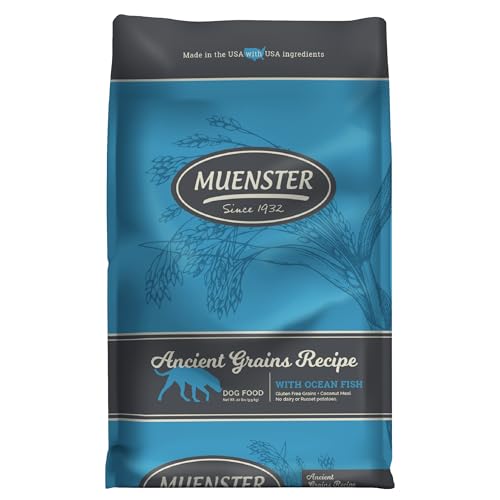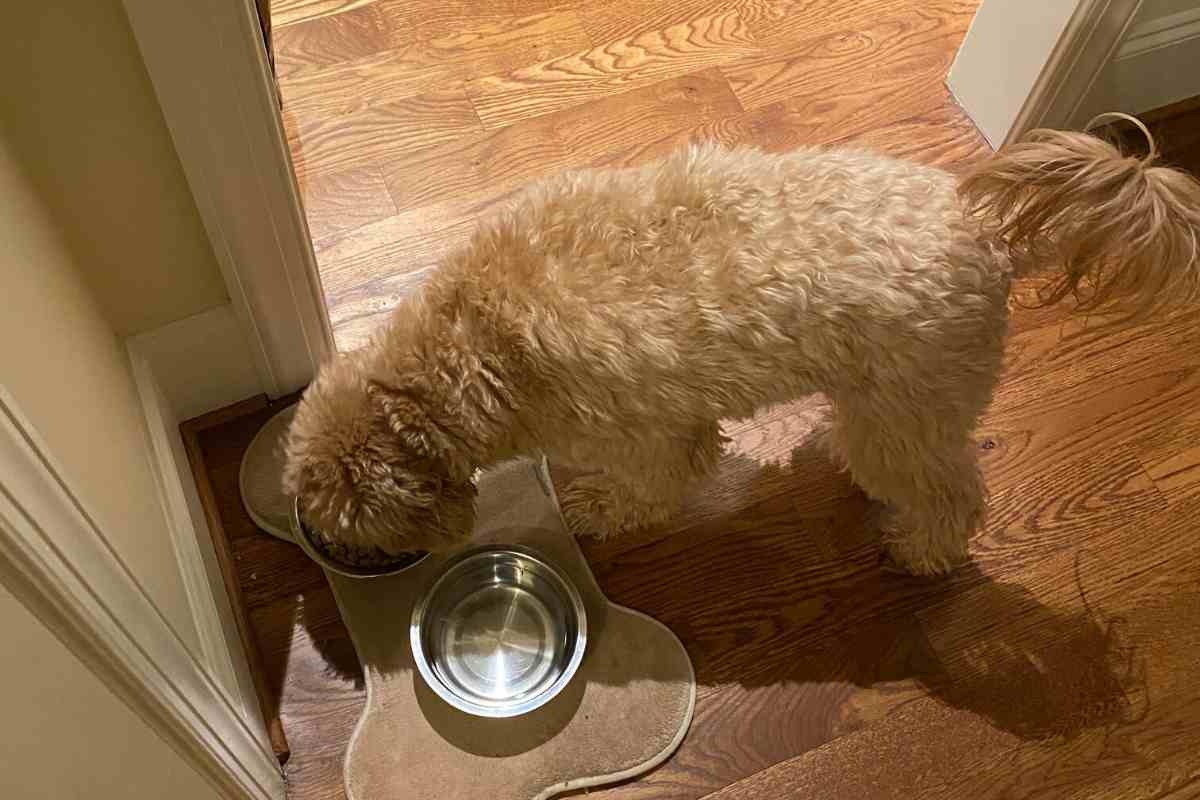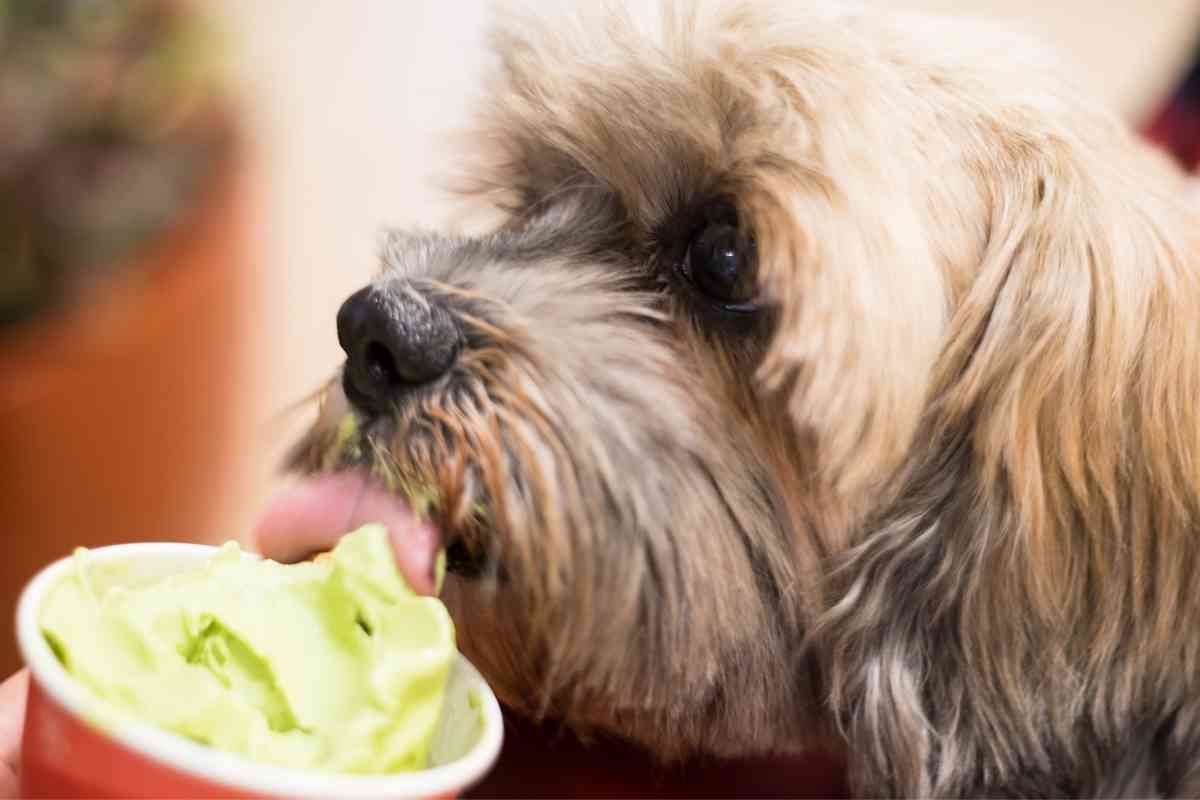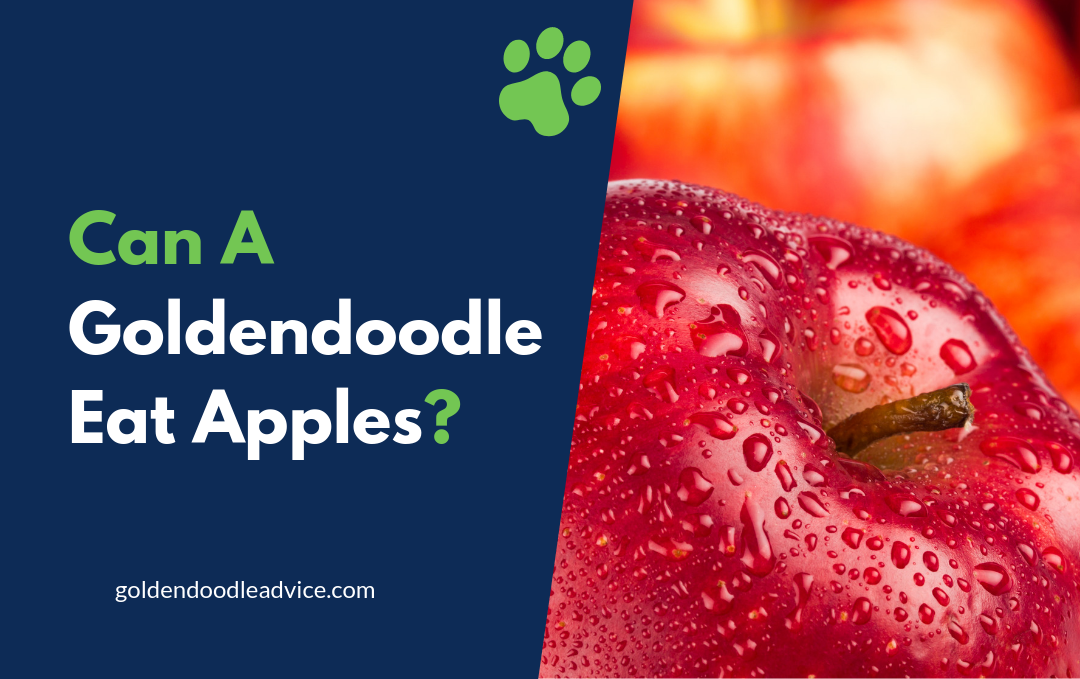The Best And Worst Foods For A Goldendoodle Diet (Vet-Approved!)

The quest for the best dog food for Goldendoodles is critical for Goldendoodle and Goldendoodle puppy owners. Careful consideration is needed in picking appropriate food for this breed, ensuring a well-balanced diet, and avoiding substances harmful to dogs. This can pave the way for your Goldendoodle’s long, healthy, and happy life.
What’s the best food for Goldendoodles?
The Goldendoodle diet should mostly consist of high-quality, well-balanced dry dog food. Many Goldendoodles have a sensitive stomach reactive to changes in their diet, so avoid giving them human foods as treats and try to avoid changing dog food brands as this can cause an upset stomach in your Goldendoodle.
When feeding your Goldendoodle or Goldendoodle puppies, you can feed two different types of diets. You can buy commercial food, or you can make your dog food every day.
Most people choose to feed commercial dog food because it is much easier to ensure that your Goldendoodle eats a well-balanced diet and does not take as much time.
Summary
This article provides tips on what to feed Goldendoodles, a popular dog breed that is a cross between Golden Retrievers and Poodles. Here are the key points of the article:
- Goldendoodles should mainly eat high-quality, well-balanced dry dog food to maintain a healthy diet.
- Commercial food is generally the easiest option to ensure that your Goldendoodle is receiving adequate nutrition.
- Dry dog kibble is good for your Goldendoodle’s teeth, as it helps remove tartar.
- Homemade diets require proper research and consultation with a veterinarian to ensure a well-balanced diet.
- There are many dog foods that Goldendoodles should not eat, such as grapesf, raisins, dairy, cherries, citrus fruits, raw dog food diet items, chocolate, coffee, avocado, onions, garlic, macadamia nuts, and salty or sugary foods.
- Feed Goldendoodle puppies 2-3 times a day with
puppy food , while adult Goldendoodles should be fed at least once a day. Twice a day feeding is recommended for adult dogs to help prevent food aggression and overeating.
Commercial Dog Food
Most commercial diets are completely balanced and are the easiest way to feed your Goldendoodle. There are many great diets that you can feed your Goldendoodle.
One of the best dog foods for your Goldendoodle is the Muenster Ancient Grains Dog Food.
When looking for a diet for your Goldendoodle, you will want to make sure that it contains a protein source as their first ingredient. And you should avoid feeding your Goldendoodle grain-free dog food.
Dry Food
Also known as dry kibbles, dry dog foods are popular and convenient options for Goldendoodle owners. They’re available in various flavors and formulations and can provide complete nutrition for your dog.
Dry dog kibble is usually the best to feed your Goldendoodle. This dry food is not only easy to feed and easy to store a large amount but also great for your Goldendoodle’s teeth. When your Goldendoodle bites down on the dry kibble, the crunchy dry dog food will help knock off any tartar that is on their teeth.
Most manufacturers include chicken meals, pork meals, or fish meals as part of the protein content for commercial dog foods.
Wet Food
These moist and flavorful options are easier for smaller Goldendoodles to chew and digest. It can also be a good choice for dogs who need to increase their water intake.
Homemade Diets
If you do not want to feed your Goldendoodle a commercial diet, you can cook for your Goldendoodle. You will need to ensure that the diet you are cooking for your dog will help meet their dietary needs.
There are many great places you can get recipes for your Goldendoodle. One site that many vets use for recipes that are completely balanced and even tailored for any disease that your Goldendoodle has is Balanceit.com.
You can pick what food you have on hand, and it will quickly make you a meal plan for your Goldendoodle.
Some foods that are good in nutrition and are easy for your Goldendoodle to digest are:
- Proteins: Chicken, turkey, Beef, Lamb, and other white meats. Avoid chicken meal as this contains a lot of chicken fat that can upset your dog’s stomach.
- Vegetables: asparagus, corn, bell peppers, broccoli, brussels sprouts, cabbage, carrots, and cauliflower, potato and sweet potatoes as great. Just introduce them one-by-one so you can identify any allergies your Goldendoodle or mini Goldendoodle has.
- Fruits: such as apples, bananas, and blueberries are great for senior pets with a lower metabolism; just make sure that there are no seeds. Other fruits like apricots, bananas, blackberries, blueberries, and cantaloupe many dogs also love to eat (again, watch for food allergies).
- Grains: While some dog breeds are allergic to grains, add brown rice, quinoa, or oats to your designer dog’s meal. These are good sources of carbohydrates and fiber.
- Supplements: Add supplements such as fish oil, calcium, and vitamin E to ensure that the food is nutritionally complete and balanced.
These are just a few of the many fruits and vegetables that you may want to include in your Goldendoodle’s homemade fresh dog food.
You can even use this list and approved human foods you can give your Goldendoodle as a treat.
Factors to Consider When Choosing the Right Food for Your Goldendoodle
Goldendoodles are a crossbreed of a poodle and a golden retriever. This means they can carry some traits from their parent breeds, which may even affect their diets.
With that in mind, here are a few things to consider when choosing the right food for your Goldendoodle.
Age
What’s the age of your dog? A Goldendoodle puppy’s nutritional needs differ from that of an adult Goldendoodle. Therefore, choosing foods specifically formulated for your dog’s age is essential.
For instance, adult food can be fed on both wet and dry food. Differently, a Goldendoodle puppy should on survive on its mother’s milk for the first three weeks.
Again, adult dog food needs more protein and fewer calories, while Goldendoodle puppies need more calories.
Nutritional Life Stage
According to Dr. Sara Ochoa, DVM, Goldendoodles need different nutrients for every growth stage. The table below shows the growth stages and nutritional requirements for Goldendoodles.
This isn’t a comprehensive outline for your dog’s dietary needs, but it can at least provide a guide. More importantly, always check with an expert for professional dietary guidance.
| Nutritional Life Stage | Age | Nutritional Requirements |
| Goldendoodle Puppy | 0-12 months | Higher protein and fat content to support growth and development. Adequate amounts of calcium and phosphorus for bone growth. |
| Adult dogs | 1-7 years | Adult dog food must contain balanced levels of protein, fat, carbohydrates, vitamins, and minerals to maintain optimal body condition and health. |
| Senior dogs | 7+ years | Lower calorie and fat content to prevent obesity. Higher fiber content to support digestion. Adequate levels of protein and joint supplements to support mobility and joint health. |
Just like our babies, Goldendoodle puppies are highly reliant on milk to survive. You should introduce other puppy foods only after three weeks.
You should also avoid giving your pups any human food; it can cause more harm than good to your dog. This is because human foods may contain harmful ingredients such as onions and garlic that can be highly toxic, especially to the pups.
As the dogs grow, the best nutrition is a well-balanced diet with more protein, vitamins, fats, and many other essential nutrients.
The Dog Size
There are three sizes of Goldendoodles: miniature, small, and large. Smaller dogs require higher energy density than larger dogs, so a healthy maintenance diet requires about 30 calories per pound of body weight.
Larger Goldendoodles have a higher metabolism and require more calories to maintain their weight and energy levels.
Again, small Goldendoodles may find it difficult to chew large kibble, while larger Goldendoodles may require large kibble to maintain their teeth.
The Dog’s Activity Level
A Goldendoodle puppy is playful and intelligent. Apart from being athletic, my furry friend likes to undergo mental stimulation.
So his 2-hour playtime always incorporates playing games like obstacle courses and active puzzle toys, which dictates his diet.
If your Goldendoodle is very active like mine, he will require more calories than a less active dog. Be sure to choose food that matches your dog’s activity level.
What Goldendoodles Cannot Eat
There are many foods that should be off-limits for all dogs. This is a list that contains many things that dogs eat that they should not.
If your dog does get a hold of any of these items, it would be best for your dog to see your vet. Some may cause just a little GI upset, but some can be very toxic to your dog’s liver and kidneys and even be life-threatening.

- Grapes or Raisins (all dogs have a grape allergy)
- Prunes
- Dairy, if given in large amounts, it is very bad for your dog’s digestive system because they were never meant to process dairy. If your dog just has a small amount, it is okay.
- Cherries: Toxic to dogs and cats
- Citrus fruits can cause an upset stomach
- Soda: Dogs don’t handle carbonation very well.
- Chocolate: dark or baker’s chocolate is very toxic to dogs
- Coffee
- Avocado
- Onions
- Garlic
- Macadamia nuts
- Salty foods
- Foods that contain a lot of sugar
- Raw food diet items like eggs or raw or undercooked meat can contain salmonella (no, the raw diet is not healthy for dogs)
Goldendoodles’ Diet-Related Health Conditions
Is your dog bloating after its meals? Like any other dog, the Goldendoodle develops complications when fed the wrong diet. Sometimes, these breeds of dogs have sensitive stomachs when you do not feed them the proper diet.
Feed your Goldendoodle smaller, more frequent meals. It can help reduce the risk of bloating, a potentially life-threatening condition.
Another health condition is hip dysplasia, which affects the dog’s hip. To support hip health, consider adding joint-supporting supplements such as glucosamine and chondroitin to their diet.
And if your Goldendoodle has a history of food allergies, avoid feeding them common allergens such as wheat, soy, and corn. Try novel protein sources such as chicken meal, lamb, or duck.
Goldendoodles can experience various health issues, such as patellar luxation and food sensitivities. Patellar luxation is a condition in which the kneecap (patella) of a dog’s hind leg dislocates.
It’s more common in small dogs but can also affect Goldendoodles as they vary in size from small to large. A perfect diet will reduce the chances of obesity, which is caused by patellar luxation.
To identify the cause of your dog’s sensitive stomach, consult your vet and consider blood tests to detect any present food sensitivities.
Ingredients
Look for high-quality ingredients in your Goldendoodle’s food, such as whole meats, fruits, and vegetables. Avoid foods that contain fillers, artificial preservatives, and by-products that might affect the digestive system.
And sometimes, grains cause allergies in dogs. If this is the case with your dog, try grain-free diets. Opt for high-quality sources of protein, such as chicken, fish, and turkey, that are easily digestible and don’t contain anything that can trigger allergies.
Brand Reputation
This may look negligible, but a dog food brand matters. You wouldn’t want your beloved Goldendoodle to consume food that will hurt his immune system.
So choose a reputable dog food brand known for producing high-quality products.
I always prefer brands that list at least five dog food ingredients and their nutrient ratios and have age-specific diets for different breeds. It helps to ensure your Goldendoodle gets the best food diet.
Cost
Dog food brands have varying prices. While choosing high-quality food for your Goldendoodle is essential, you must consider your budget.
Look for food that provides the right balance of quality and affordability. And if you’re digging deep in the pockets to keep your dog healthy, you can try out a well-balanced home diet.
Goldendoodle Diet FAQs
Why shouldn’t I feed my Goldendoodle a raw diet?
Here are the potential risks:
- You could expose your furry friend to the risk of bacterial contamination. Raw meat can be contaminated with harmful bacteria such as salmonella and E. coli, making your dog sick.
- Creating a balanced diet that meets your dog’s nutritional needs can be challenging when feeding a raw food diet.
How often should a Goldendoodle eat?
When your Goldendoodle is a pup, you should feed them 2 to 3 times a day. Goldendoodle puppies should be eating a puppy formula specifically designed for their growing bodies.
P
Adult dogs should eat at least once a day. Most people will feed their Goldendoodle twice a day as their Goldendoodle tends to be more content with the twice-a-day feeding.
When you feed Goldendoodle a few times a day, they are less likely to have any food aggression and will stay full longer. This will help prevent them from destroying things in the house or eating things that they should not eat.
How much should a Goldendoodle eat?
Usually, the feeding guidelines are on the back of the bag. Sometimes this is a little more than your Goldendoodle needs, especially if they are not very active.
A good rule to follow is 1 cup of food per 15 pounds of body weight a day. So a 45-pound dog should eat about 1.5 cups of food twice a day.
You can also monitor your dog’s weight to know if you are feeding them enough dog food. If your dog looks too thin, you will need to increase your dog’s food. If they start gaining weight, you will need to decrease your dog’s food.
You will also need to consider their exercise. Some Goldendoodles may participate in agility or other sporting events.
During their training and competition months, you will need to increase their dog food intake to make up for the extra energy, whereas in the off-season, you need to decrease the amount of dog food they eat to help keep them at a healthy weight.

What if My Goldendoodle is a picky eater?
If your Goldendoodle is a picky eater, there are a few things that you can do to help entice them to start eating their dog food.
Add Warm Water to Their food
You can try to add a little bit of warm water to their dog food. This will make a gravy-like consistency when mixed with the dry kibbles. It will also make the dry kibble a little softer, and your Goldendoodle may like to eat it.
Add in Some Can Food
Adding a small amount of canned dog food to your dog’s dry food will help make their food more appealing. Just a small spoon full added to the food and fully mixed will help.
If you do not mix the wet dog food in with the dry food, your Goldendoodle may just eat the wet food off the top and leave the rest of the dry kibble.
Switching Diets or Protein Source
There may be something in the diet that you are feeding that they do not like. Switching to a different diet or a different protein may help. If you are feeding chicken and rice, try switching a lamb and rice or a duck protein.
See Your Vet
If your Goldendoodle has suddenly stopped eating their dog food, it may be time to see your vet. Some illnesses will cause your dog not to want to eat.
Your vet can examine your Goldendoodle and make sure that there is nothing causing your dog to feel bad to cause them to not want to eat.
What Treats Can My Goldendoodle Eat?
There are many great treats that are available for your Goldendoodle. Some of these treats also have added nutrients, vitamins, minerals, and supplements that have health benefits too.
You can also give your dog fish oil supplements to ensure they are getting enough omega-3 fatty acids, which help with brain development and keeps their coat healthy.
Glucosamine can help their joints, which is great for this breed since hip dysplasia is common in both the Golden Retriever and Poodle parent breeds.
And a simple multivitamin can help support their immune system. But, if they are getting a high-quality, nutrient-rich dog food, they shouldn’t need supplements with much frequency.
If your Goldendoodle has joint or skin issues, look for a treat that will help with these problems.
These treats have added calories that can quickly cause your Goldendoodle to become obese.
Make sure that the treats that you feed your Goldendoodle only account for 10% of your Goldendoodle’s daily food intake.
Final Thoughts
When looking for what your Goldendoodle can eat, there are many different things to consider. Make sure that you steer clear of the things on the off-limit list as they can cause your dog many issues.
The diet you feed your Goldendoodle is key to a healthy dog. Keeping your Goldendoodle at an ideal weight will help keep them healthier for longer.
Related Content You May Find Interesting
Here are some more articles that may interest you about Goldendoodle diets!
Related Reading
- The Best And Worst Foods For A Goldendoodle Diet (Vet-Approved!)
- How Much To Feed A Goldendoodle Puppy: A 6-Stage Guide
Best Food for Goldendoodle Puppy: Top Picks and Feeding Guide - How Much Water Should a Goldendoodle Puppy Drink?
- At What Age Is A Miniature Goldendoodle Fully Grown?
- How To Take Care Of A Goldendoodle Puppy: 15 Veterinarian Tips
- Goldendoodle Ear Infection: 3 Common Problems & Treatments (Veterinarian Weighs In!)
- Why Does My Goldendoodle Itch So Much? (Veterinarian Advice!)



